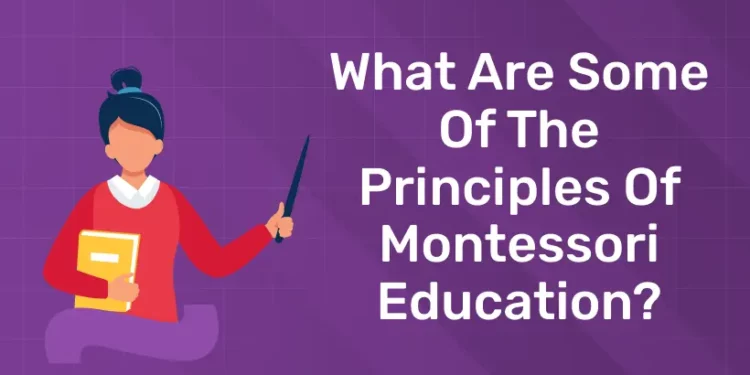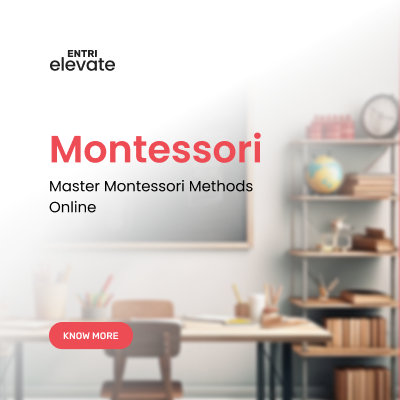Table of Contents
Doctor Maria Montessori spent several years observing and experimenting before developing the tenets of Montessori education. They are predicated on respect for how kids learn. The fundamentals of Montessori education are as much about describing how Montessori differs from traditional education as they are about comprehending how children learn. In this blogpost we are discussing about the principles of montessori education.
Unlock your passion for education and shape young minds as a Montessori teacher!
The Principles Of Montessori Education
Respect For The Child
A great deal of the Montessori philosophy is based on a profound regard for children. This entails valuing each child for who they are, allowing them to make their own decisions, move around, own up to their mistakes, and do tasks at their own pace. Montessori teachers approach their work and interactions with students with a sincere regard for them.
Mind That Is Absorbent
According to Dr. Maria Montessori’s research, a child’s growth is most critical during the first six years of life. She referred to this time as the child’s “absorbent mind” period to characterize their ability to take in information from their surroundings like a sponge. Children build the roots of their intelligence and personalities at this period, as well as quickly developing a grasp of their culture and environment.
Teaching the Entire Child
By offering educational opportunities that enhance a child’s cognitive, motor, emotional, and social development, Montessori education aims to maximize each child’s potential. The Montessori Curriculum includes language and math in addition to practical life, sensory, and cultural subjects. Every facet of a child’s growth and education is connected and given equal weight.
Sensitive Periods
According to Dr. Maria Montessori’s observations, children go through developmental phases during which they are most able to acquire particular knowledge and abilities. She referred to these phases as “sensitive periods,” which basically represent windows of time during which learning can occur. Sensitive times are characterized by extreme focus, repetition, dedication to a task, and prolonged durations of concentration.
Customized Education
Every child’s Montessori learning program is tailored to meet their individual requirements, interests, and developmental stage. Based on each child’s academic development, one-on-one lessons using the Montessori materials are taught. Teachers monitor every student’s development and provide them with assistance as they move through the curriculum.
Liberty Of Movement And Decision-Making
According to Dr. Maria Montessori, children learn best when they are allowed to roam around freely, select the activities they want to do, and pursue their interests. Children in a Montessori classroom are allowed to roam about the set up area, work where they think they will learn the most, and use practical experiences to uncover learning objectives. The majority of Montessori education is hands-on, personalized, self-correcting, and geared toward the interests and requirements of each child.
Prepared Environment
Another term for the the Montessori classroom is prepared environment . This learning area has been thoughtfully designed, with everything having a specific role to perform. Kids can develop rational mental processes with the help of this clear sense of order. “Order in environment and mind” is the core concept. Children can choose what they want to work on, follow their interests, and advance at their own speed in this area.
Individualism
Montessori education emphasizes independence. It gives kids the tools, support, and surroundings they need to learn how to take initiative and think for themselves. According to this theory, kids are innate learners who, given the correct conditions, are eager and able to educate themselves. The ultimate objective of a Montessori education is self-reliance.
Motivation
The Montessori method adopts the stance that education is a form of self-reward. There are no gold stars in a Montessori classroom to commend students’ learning. Rather than this, youngsters feel a sense of pride when they finish a task and learn how to do it on their own.
Self-Teaching
The idea of self-teaching is among the fundamental tenets of the Montessori Method. It is predicated on the idea that, given engaging learning materials, kids are both capable and eager to educate themselves. To fill this need and provide kids the freedom to choose how they want to learn, Montessori materials were created. Montessori teachers set up the atmosphere, offer direction, and support so that kids can learn on their own.
Unlock your passion for education and shape young minds as a Montessori teacher!
CONCLUSION
1: What is the primary focus of the first plane of development in the Montessori method?
A certain amount of structure and a great deal of “independent study” are prerequisites for following the Montessori method. Give kids enough time to grow holistically and the freedom to advance at their own speed. Every child is different, so choose the teaching strategy that best suits their requirements and personality. Deciding whether a Montessori school is the right match for your child requires first and foremost that you get to know them.
| Montessori Teacher Training in Different Cities |
| Montessori Teacher Training Course in Trivandrum |
| Montessori Teacher Training Course in Kollam |
| Montessori Teacher Training Course in Kochi, Ernakulam |
| Montessori Teacher Training Course in Calicut |
Frequently Asked Questions
Why are multi-age classrooms used in Montessori education?
Children can learn from each other in a community-like setting created by using multi-age classrooms. While older children transmit concepts they have mastered to younger ones, younger children learn from watching their older classmates.
How is individualized learning implemented in Montessori education?
By adapting lessons and activities to each child’s developmental stage, interests, and pace, individualized learning is put into practice. Based on their observations, teachers give instruction to students in small groups or one-on-one.
How are practical life skills integrated into Montessori education?
Activities involving daily chores like cleaning, clothing, gardening, and cooking combine practical life skills. Children’s independence, focus, fine motor abilities, and sense of responsibility are all enhanced by these activities.
What are Montessori materials?
The hands-on, self-correcting Montessori objects are specially made educational instruments. Numerous topics are covered, including language, cultural studies, mathematics, sensory studies, and practical life.










